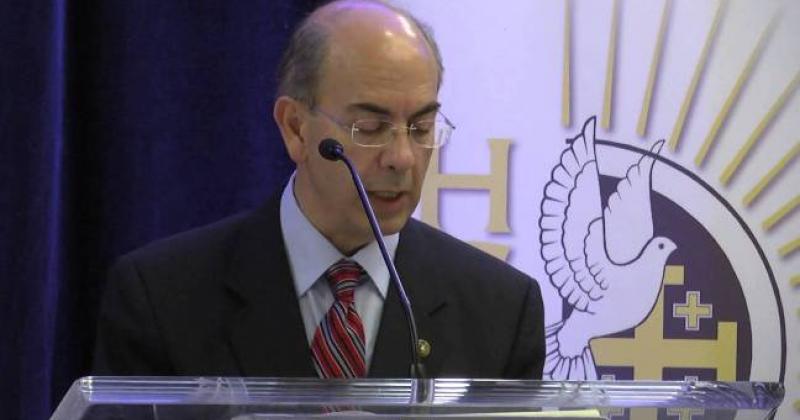A horrific massacre of 147 students and others took place last week at Garissa University College in Kenya. Christians were the main target of Al-Shabaab, the al-Qaida-affiliated Somali terrorist group.
In February 2015, 21 Egyptian Coptic Christian migrant workers were beheaded by an ISIL-affiliated militia group on the beach along the southern Mediterranean coast of Libya. Their fault: being “people of the cross.”
The daily persecutions of Christians are too many and, according to “Open Doors”—which issues the annual World Watch List that ranks countries by the severity of persecution—most offences are committed in North Korea, Somalia, Iraq, Syria, Afghanistan, Sudan, Iran, Pakistan, Eritrea, and Nigeria.
His Excellency Archbishop Silvano M. Tomasi, permanent observer of the Holy See to the United Nations and other international organizations in Geneva, reported two years ago on “an estimate of more than 100,000 Christians are violently killed because of some relation to their faith every year. Other Christians and other believers are subjected to forced displacement, to the destruction of their places of worship, to rape, and to the abduction of their leaders ….”
While the persecution of Christians can be traced from the first century of the Christian era to the present time, persecutions occurring today are of much greater frequency and proportion. The World Evangelical Alliance estimates that over 200 million Christians in some 60 countries are denied basic human rights because of their faith.
As we meditate on the voice and touch of Jesus Christ, as we have this past Easter—commemorating His Crucifixion, Death, and Resurrection—we cannot help but hear Him say at the Last Supper, “This cup is the new covenant in my blood, which is poured out for you” (Luke 22:20). We cannot help but hear Himforgive his killers, “Father, forgive them, for they do not know what they do” (Luke 23:34).
We cannot help but reflect on and pray for Christians who have been and are being persecuted and martyred because of their faith. Along with Matthew 5:10-12, we state, “Blessed are those who are persecuted because of righteousness, for theirs is the kingdom of heaven. Blessed are you when people insult you, persecute you and falsely say all kinds of evil against you because of me. Rejoice and be glad, because great is your reward in heaven, for in the same way they persecuted the prophets who were before you.”
Pope Francis, in his "Urbi et Orbi" Easter message, teaches,
“From the risen Lord we ask the grace not to succumb to the pride which fuels violence and war, but to have the humble courage of pardon and peace. We ask Jesus, the Victor over death, to lighten the sufferings of our many brothers and sisters who are persecuted for his name, and of all those who suffer injustice as a result of ongoing conflicts and violence.”
Similarly, in his 2015 Easter Message from Jerusalem, Bishop Munib Younan, the Evangelical Lutheran Church Bishop of Palestine and Jordan and president of the Lutheran World Federation, asks,
“Who will roll away the stone of extremism, of terror and violence, or the persecution of Christians and many ethnic and religious communities? Who will roll away the stones of anti-Semitism and Islamophobia? Who will roll away the stone of the ongoing occupation, of the separation barrier, of injustice? The obstacles are so large, and we are just a few. Who will roll away the stone for us?”
Heartfelt questions but no easy answers. One is given by Bishop Younan himself,
“Now is a time to believe in the power of resurrection, which is the power of embracing the other over denying the other. Christ risen is the power of goodness over evil, love over hate, light over darkness and life over death. Now is the time to be living witnesses to resurrection.”
A connected answer is given by His Beatitude Michel Sabbah, Patriarch emeritus of Jerusalem. In a recent conference address titled, “Christians in Israel and in the Middle East, Our Present and Future,” he explains,
“With faith, with our sense of being a people with a mission, we are strong, strong not to kill or to be aggressive against anyone, but to better love and contribute to the general human building of a fraternal society, in which everyone finds himself as a brother or sister. If we are faced by death and massacres, we have to educate ourselves to live the sense of being a martyr: giving our life for the life of our societies, even for those who kill us, so that even these may also reach the true sense of life…. In exceptional situation, where we are faced directly by death, we have two choices: to become soldiers and form armies to kill some of our enemies and to be killed for politics, on the one hand, or to give our life as martyrs for our faith and for the life of our own enemy, on the other hand. The second alone is the Christian choice. It was the choice of the first Christians here in Jerusalem, in the Middle East and in the entire Roman Empire. They died for their faith and for the life of their persecutors, and finally they won.”
We believe that Jesus is risen and is above all creation. We must not be bystanders but active participants in Jesus’ story. Goodness can transform evil. We perform our calling by putting faith into action. In Embracing Travail: Retrieving the Cross Today, Cynthia S. W. Crysdale writes, “… choosing to follow Jesus means embracing pain, choosing to love, forgiving others, letting go of justice as revenge.”
That is the meaning of Easter. It is our Christian choice.
